#1794
Text
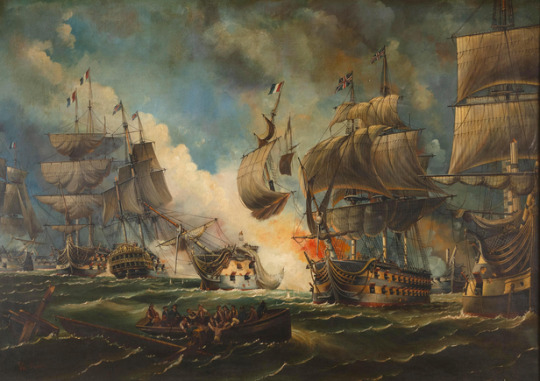
Battle of the Glorious 1st June 1794, by William Griffin, 19th century
114 notes
·
View notes
Text
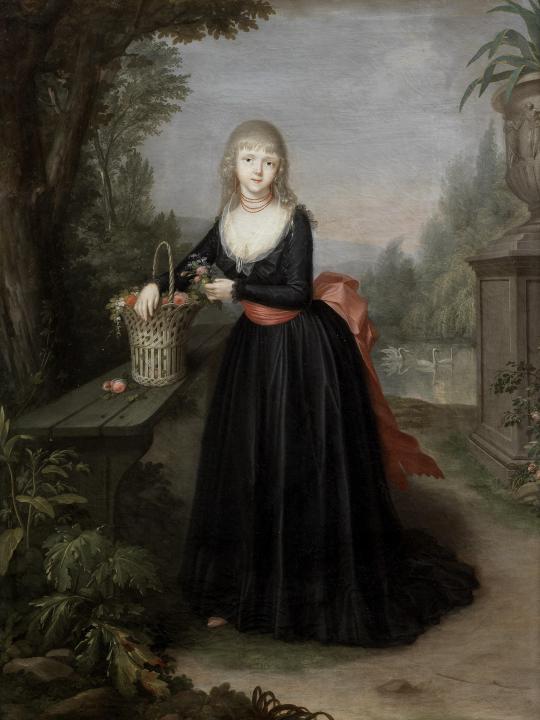
Portrait of a young woman in the grounds of the Villa Borghese, Rome by Augusto Nicodermo, 1794
81 notes
·
View notes
Text
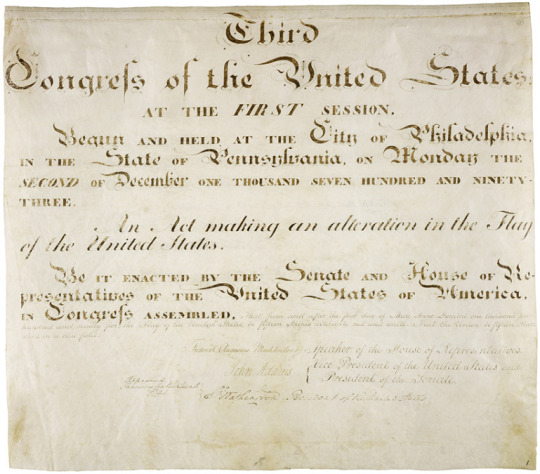
An Act Making an Alteration in the Flag of the United States
Record Group 11: General Records of the United States GovernmentSeries: Enrolled Acts and Resolutions of CongressFile Unit: Public Law, 3rd Congress, 1st Session: Alteration in the Flag of the United States, January 13, 1794
Third Congress of the United States AT THE FIRST SESSION Begun and held at the City of Philadelphia, IN THE State of Pennsylvania, ON Monday THE SECOND OF December ONE THOUSAND SEVEN HUNDRED AND NINETY-THREE. An Act making an alteration in the Flag of United States. Be IT ENACTED BY THE Senate AND House OF Representatives OF THE United States of America, IN Congress ASSEMBLED, [handwritten] That from and after the first day of May Anno Domini one thousand seven hundred and ninety five the Flag of the United States, be fifteen Stripes alternate red and blue. That the Union be fifteen Stars white in a blue field. Frederick Augustus Muhlenberg Speaker of the House of Representatives. John Adams [start bracket] Vice President of the United States and President of the Senate. [end bracket] Approved January the thirteenth 1794 Go. Washington. President of the United States.
28 notes
·
View notes
Text
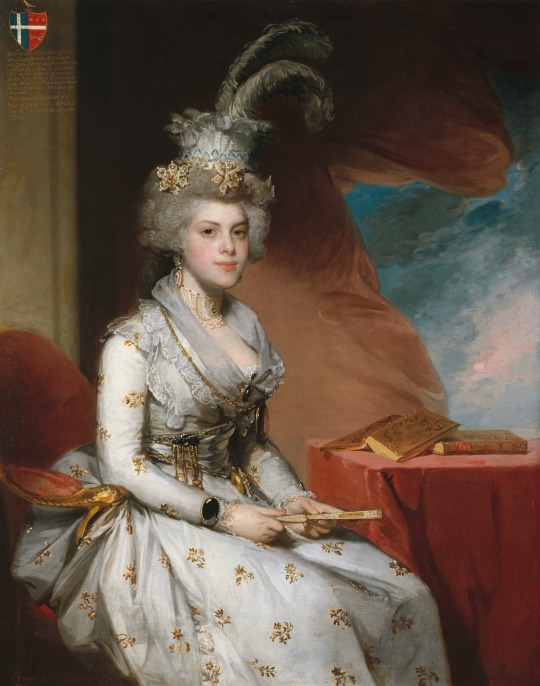
Oil painting, 1794, American.
Portraying Matilda Stoughton de Jaudenes in a white dress with gold details.
Painted by Gilbert Stuart.
Met Museum.
#1794#1790s#1790s dress#1790s painting#1790s usa#painting#18th century#dress#Matilda stoughton de jaudenes#Gilbert Stuart#met museum#usa
40 notes
·
View notes
Photo
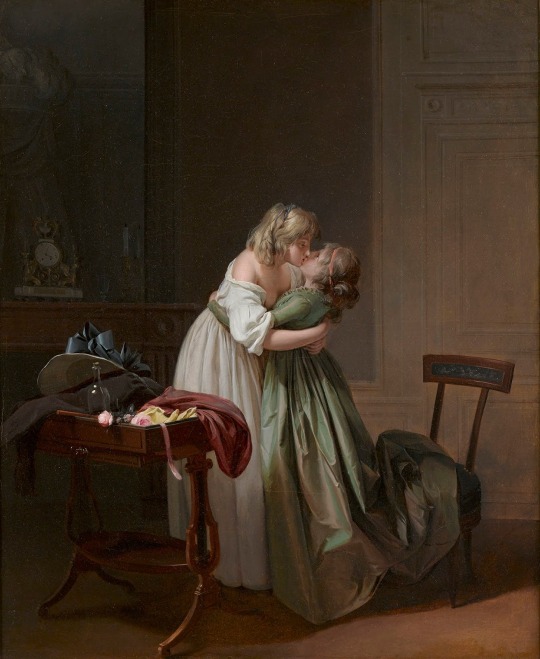
Deux jeunes femmes s’embrassant, Louis-Leopold Boilly, 1790-94
#deux jeunes femmes s'embrassant#Louis-leopold boilly#Louis Leopold boilly#boilly#1790#1791#1792#1793#1794#1790s#1700s#18th century#painting#art
139 notes
·
View notes
Text
Murat and Bessières at school
Still looking for something for @flowwochair, I came across this very brief remark in the memoirs of general Jean Sarrazin (more about him below):
When I was seven, my father took me to the college in Cahors, the capital of the Lot department. My father chose this college in preference to the one in Agen, on the advice of the Comte de Fumel, whose tenant he was. [...] I was raised with Murat, Bessières and Andral, with whom I was friends. Bessières was well-behaved, a little Cato. Murat was a scatterbrain, boisterous and concerned only with his own pleasures. He was a true Paris brat (gamin de Paris).
Now, I assume this author is a highly suspicious source. Not only because he, obviously, is yet another Gascon, but mostly because he, after having served in the Revolutionary and Imperial army, defected to the British in 1810, and supplied them with plenty of information on Napoleon’s plans and the most prominent leaders of his army. As a matter of fact, in 1811 he had a book published with descriptions of several prominent figures in France, called "The Philosopher", the first chapter of which is dedicated to Marshal Soult, who was probably the most interesting to the British due to him being their main opponent in Spain, and who in this book receives much more praise than is due to him. While much of it may be plain wrong or at least cannot be verified, I feel like it’s an interesting insight into what people in the army at the time thought about these folks.
Among other things, Sarrazin gives a long description of the battle of Fleurus, with some interesting twists. Mostly he claims that Lefebvre owed his reputation as a great general only to Soult, who at the time was his chief-of-staff, and even has general Marceau exclaim that Soult had won the battle of Fleurus for them. This is completely opposite to Soult’s own memoirs, where Soult has nothing but praise for Lefebvre’s actions during the battle of Fleurus, and barely mentions his own. However, there seems to be some truth to Soult coming to the aid of one rather desperate general Marceau, as Soult mentions this, too, though in a very different context.
The demand to detach some troops at a very inopportune moment is made in Soult’s memoirs as well – but not by Marceau, but by Saint-Just. And it’s not Lefebvre and Soult who refuse, but Jourdan (whom Soult praises a lot for having had the courage to stand up to what he calls "Saint-Just's presumptuous ignorance"). I am not sure in how far these memoirs are influenced by Soult’s own long life and his own political situation, but he clearly despises Saint-Just. According to his memoirs, the whole officers’ corps was shaking with fear while the politicians were with them, literally scared to death. In front of Charleroi, one artillery capitaine allegedly was executed for having failed to meet the schedule Saint-Just had set for him.
Again, I have no clue what this is based on. But I thought it worth mentioning, maybe somebody from the Frev community can shed some light onto this incident.
(Personally, I feel like Soult may be projecting here a little of "Joseph's presumptuous ignorance" onto another episode of his life 😋)
#napoleon's marshals#jean de dieu soult#battle of fleurus#1794#saint just#francois joseph lefebvre#jean baptiste jourdan#frev
36 notes
·
View notes
Text
Georges – "What If" or an Alternative Life
We all know how the life of Georges de La Fayette, only son of Adrienne and Gilbert turned out. Born into a life of privilege, separated for the first time from his family as a young boy to make sure that his father’s status would not interfere with his studies, he later had to flee with his tutor into the mountains and then to America. In America he was a constant wanderer before returning to France and joining his family in exile in Danish-Holstein. The family was finally able to return to France for good, Georges joined the Army, married, had children, became a politician, returned with his father to America in 1824/25 and finally inherited his title as Marquis de La Fayette – just like his two sons later inherited the title from him.
While his father, his mother and his sisters were all imprisoned at various points in time for various reasons and durations, Georges remained free and was able to live, relatively speaking, “comfortably” in America. But let us imagine for a moment how his life could or would have looked like if some things had been different. Because Georges was a family man – even as a grown man he lived with or near his parents (granted, their living arrangements were normally quite spacious, so …), he married the daughter of one of his father’s friends and colleagues, he followed his fathers into the military and in politics, he cared for his mother, he accompanied his father to America – what would happen if his family had died during the French Revolution? Not only his mother and father but maybe even his sisters? Chances were rather high, Adriennes life was threatened by illness and the guillotine (her grandmother, mother and sister were all guillotined) and La Fayette’s life was threatened by illness, the French warrant for his arrest and his status as a Prisoner of War in both Prussia and Austria.
This questions “how would Georges’ life look like” is not completely theoretical. When Adrienne send her son to America, she wrote both to James Monroe and to George Washington and her letters make it clear that she had planned for the eventuality that Georges maybe had to stay for a very long time in America.
Adrienne wrote in an undated letter, probably from November of 1794, to James Monroe:
I ask him kindly to look after my son. I want him to finish his education in an American house of commerce. It would appear to me preferable to set him up at the residence of a consul of the United States. I want him to join their navy, and if it is absolutely impossible for him to begin his first line of duty at sea on an American vessel, I would have him serve on a French merchant ship.
I encourage the minister of the United States to recall that my son was adopted by the state of Virginia in 1785, and that he still has his certificate as a citizen of that state. I foresee therefore no difficulty in his entering the service of this second country, friend and ally of the French Republic.
Papers of James Monroe, 3: 165; Bookmen’s Holiday, x: 20
She wrote secondly in a letter to George Washington on April 23, 1795:
Sir, I send you my son. (…) it is with the deepest and most sincere confidence that I put my dear child under the protection of the United States, which he has ever been accustomed to look upon as his second country, and which I myself have always considered as being our future home under the special protection of their President with whose feelings towards his father I am well acquainted.
The person [Félix Frestel] who accompanies George, has been, since our misfortunes, our support, our protector, our comfort, and my son’s guide. My desire is that he should continue to direct him, that, until his arrival, my son should remain privately in M. Russell’s [Joseph Russell] house, that, once united, they should never separate and that we may have some day the happiness of meeting all together in the land of liberty. To the noble efforts of that friend, my children owe the preservation of their mother’s life. (…) While receiving from him each day the examples of the most generous virtues, his heart was being formed for those noble feelings which have preserved and always will, I hope, preserve in his soul, the love of a country where such dear victims have been sacrificed, where his father is disowned and persecuted, and where his mother was during sixteen months confined in prison. The last sacrifice which this friend has made for us is that of separating himself from a family he dearly loves. (…) My wish is that my son should lead a very secluded life in America, that he should resume his studies interrupted by three years of misfortunes, and that, far from the land where so many events are taking place which might either dishearten or revolt him, he may become fit to fulfil the duties of a citizen of the United States whose feelings and whose principles will always agree with those of a French citizen. (…)
Noailles Lafayette
Mme de Lasteyrie, Life of Madame de Lafayette, L. Techener, London, 1872, pp. 317-322.
I shortened the letter in some parts but there is a complete version under the cut for everyone who is interested.
Adrienne gives very detailed instructions, how Georges should be brought up. In short, she wants him to:
Continue his education under Frestel’s tutelage, without too much ado
Start an apprenticeship, I believe, in a house of commerce
Work on an American merchant ship, or, if that is not possible, on a French merchant ship
Be the picture-perfect American citizen without forgetting his identity as a Frenchman
This is all pretty straight forward and we could end our little thought experiment here and take Adrienne’s instructions as the alternative life Georges could have lead. But I would like to elaborate on some aspects.
Félix Frestel
See, on this blog we appreciate Festel and all that he did. Adrienne herself wrote it in the letter to Washington how much the La Fayette’s owned to Frestel. He was Georges tutor long before the Revolution and likely also lived with him during this time. By all accounts he and Georges were close and Georges’ parents also liked and respected Frestel a lot. He risked his personal safety to hide George, helped Adrienne when her fate hung in the balance, he uprooted his entire life and left a family that he “dearly loved” to follow Georges to America – friendship and all things considered, this went clearly beyond the call of duty of a tutor. Adding to that my suspicion that he was not paid during the French Revolution. Both from a logistical and a financial point, paying Frestel would have been difficult and while we have letters from Adrienne to Monroe, asking him to do certain financial transactions for her, there is not letter from her reminding or asking him to pay Frestel. This is certainly no conclusive evidence but I have a very strong hunch.
In America, Frestel was father, friend and teacher for Georges and I am of the firm believe that he would not have easily deserted the boy, even if their stay in America would have been a longer one. I can think of two possible scenarios. One possible scenario would be that Frestel stayed with Georges until he boy would have reached his majority and finished his education in so far as that he was settled with an American merchant firm and learning there. Frestel might have returned then to France – he was free to do so, there was no warrant for his arrest and his name was not on the list of émigrés – and be reunited with his family. Since he was such a loyal soul and very devoted to his pupil, I could imagine him doing what Adrienne in reality did. Going back to France and trying to reclaim the possessions of the La Fayette family for Georges.
In the second scenario, Frestel decides to stay in America, possible because he had started his own family there. When he left France, he was unmarried and childless. It was therefor very possible for him to fall in love in America and decided to stay there with his family. Just as well he could take his wife and potential children with him back to France.
The Merchant Navy
While first reading Adrienne’s letters I found it quite peculiar that she was so insistent on the merchant navy. The merchants trade is one thing, but the service on a merchant ship means a live at sea and some potential dangers that you do not have, if you sit on dry land behind your desk. It could have been Georges expressed desire but since later in France as an adult he choose the Army over the Navy (and there is no indication that he ever considered the navy), I am somewhat doubting that. Life at sea however promised “adevntures”, comradery and occupation – all things that Georges would have needed and liked. Under British law, crew members of merchant ships were often pressed into the military service due to their skills and experiences. American law was different in that regard and Georges would not have worked as a common sailor, so he should have been all good on that front. Being at sea for long stretches of time was also making social engagements difficult. Adrienne had seen what politics can due to peaceful family life and she maybe intended to set Georges up in way where he would not join the politics of his time.
Being an American – Being a Frenchman
Adrienne herself wrote that she hopes her son “preserve in his soul, the love of a country where such dear victims have been sacrificed, where his father is disowned and persecuted, and where his mother was during sixteen months confined in prison”. Later in life, La Fayette wrote in a letter to his son that they should never forget, no matter what had happened or will happen, France is their country and their home. Georges was born and breed in Paris and he was a patriot. In the real turn of events, he would go on risking his life for France. The question therefor is, would he stay in America or return to France? Both are very real possibilities but, in our scenario, I lean more towards staying in America. We assume that his close family is dead (and with that more or less all family members on his father’s side) and many of his Noailles relatives were also dead or had fled the country (his mother’s father for example, he settled in Switzerland). He had extended family that settled into exile in Wittmold but even in reality he only joined them once his sisters and parents were freed and settled there as well. This extended family alone did not seem to be such a huge pull-factor for him. In our scenario he has nothing to return to, no family, no money, no title, no land – even if we assume that Frestel or Georges managed to get some of the family’s possessions back, they would have been empty, void of life and happiness. They would have been shadows, painful reminders of his former life and all that he had lost. Georges was utterly devoted to his family and to his father in particular. I do not think that he could just let go and start over without constantly lingering in the past. But then again, he was French. France was his home and everything that was left from his family was there in France. That again leads us to two possible scenarios.
In the first one, Georges stays in America. If someone was able to get some or all of the family’s former holdings back, he would maybe sell them and use the money to provide for the family he would (absolutely and definitely) start in America. He maybe would even start his own house of commerce. He could also use some of the money to provide for his father’s elderly widowed aunt still living in France. La Fayette had loved her dearly and vice versa. She would have been too old to come to America but Georges could find other means of making sure she was comfortable. He would inherit his father’s titles and probably not use them much, if at all, while in America. Instead referring to his father as “General La Fayette”
In the other scenario, Georges return to France, either with a wife he married while in America or he finds himself a wife in France. Either way, the girl in question would likely been the sister/daughter/niece/etc. of one of his father’s acquaintances. I could imagine that in France, and especially in Paris, even while serving in the merchant navy, there would have been high chances of Georges being caught up in his “old life”. In this scenario, I can very well see Georges enter politics and most importantly bump heads with Napoléon, just as his father would have done. But where Georges had his father’s opinions and views, he did not had his father later “immunity” towards Napoléon’s antipathy.
Anyway, this whole post has turned into a long “what if” rambling but if you made it to this point, I would be really interested to hear your opinions!
Adrienne to George Washington, April 18, 1795
Sir, I send you my son. Although I have not had the consolation of being listened to nor of obtaining from you those good offices which I thought likely to bring about his father’s delivery from the hands of our enemies, because your views were different from mine, nevertheless my reliance on your kindness is not diminished, and it is with the deepest and most sincere confidence that I put my dear child under the protection of the United States, which he has ever been accustomed to look upon as his second country, and which I myself have always considered as being our future home under the special protection of their President with whose feelings towards his father I am well acquainted.
The person [Félix Frestel] who accompanies George, has been, since our misfortunes, our support, our protector, our comfort, and my son’s guide. My desire is that he should continue to direct him, that, until his arrival, my son should remain privately in M. Russell’s [Joseph Russell] house, that, once united, they should never separate and that we may have some day the happiness of meeting all together in the land of liberty. To the noble efforts of that friend, my children owe the preservation of their mother’s life. Notwithstanding all the perils he encountered on his way, he made known to M. Morris the horrible situation I was in, and, after having had the courage to traverse the whole of France in those times of horror, following a prisoner, who was to all appearances devoted to death, he animated the zeal of the American minister to whose applications I probably owe that my sacrifice was deferred until the revolution of the 10th of Thermidor [July 28]. He will tell you that I have never given a pretext for any accusation against me, that my country can reproach me with nothing, and I myself will tell you that it is near him and with him that my son invariably learnt, even in the depth of misery, to discern between liberty and the horrors to which its name has been associated. While receiving from him each day the examples of the most generous virtues, his heart was being formed for those noble feelings which have preserved and always will, I hope, preserve in his soul, the love of a country where such dear victims have been sacrificed, where his father is disowned and persecuted, and where his mother was during sixteen months confined in prison. The last sacrifice which this friend has made for us is that of separating himself from a family he dearly loves. I ardently wish M. Washington to know what he is, and how much we are indebted to him. A letter will very in sufficiently fulfil my object. When shall I be able to do so myself? My wish is that my son should lead a very secluded life in America, that he should resume his studies interrupted by three years of misfortunes, and that, far from the land where so many events are taking place which might either dishearten or revolt him, he may become fit to fulfil the duties of a citizen of the United States whose feelings and whose principles will always agree with those of a French citizen. I shall not say anything here of my own position nor of the one which interests me still more than mine. I rely upon the bearer of this letter to interpret the feelings of my heart, too withered to express any others but those of the gratitude I owe to MM. Monroe, Skypwith, and Mountflorence for their kindness and their useful endeavours in my behalf. I beg M. Washington will accept the assurance etc.
Noailles Lafayette
The French original can be found here:
“To George Washington from the Marquise de Lafayette, 18 April 1795,” Founders Online, National Archives, https://founders.archives.gov/documents/Washington/05-18-02-0041. [Original source: The Papers of George Washington, Presidential Series, vol. 18, 1 April–30 September 1795, ed. Carol S. Ebel. Charlottesville: University of Virginia Press, 2015, pp. 51–54.]
#marquis de lafayette#la fayette#french history#french revolution#american revolution#american history#history#letter#georges de la fayette#adrienne de lafayette#adrienne de noailles#1794#1795#george washington#james monroe#founders online#alternative history#felix frestel
7 notes
·
View notes
Text
Hi Max

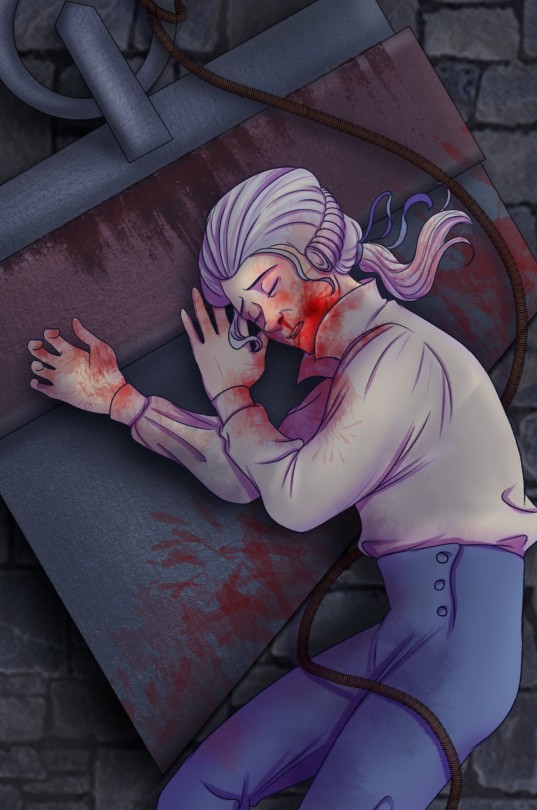
#history art#art#french revolution#frev#robespierre#maximilien robespierre#thermidor#1794#my art#I died while drawing this
82 notes
·
View notes
Text

happy new year!!
i almost missed the deadline for IWTV holiday card exchange but ✨didn't✨
this one is for suika <3
i had this screenshot saved on my phone for quite a while and couldn't locate the original tweet now, anyway happy to finally use this reference!

(i too know nothing about this movie)
two more holiday cards are on their way in the mail, maybe i'll post photos of them once they've safely reached their destinations. i had previously thought i'd be home with absolutely nothing to do so i deemed it wise to promise 3 cards. HOWEVER i ended up traveling for 2 weeks and so cards were made hastily at the last possible moments. but i'm relieved i got them done in the end anyway :') i've also received some LOVELY holiday card art (both feat. armand & daniel !!!!!!) on twitter and it's made me so happy! this was such a sweet initiative & i'm thankful to the organizers <3 happy holidays!
#iwtv#iwtv fanart#lestat de lioncourt#armand#armandstat#lesmand#blood in the snow#holiday card exchange#happy new year#1794#2024#sam reid#assad zaman#iwtv amc#cordelia movie poster#iwtv blood in the snow
12 notes
·
View notes
Text

▪︎ Cither viol.
Maker/Artists: Perry & Wilkinson (Irish, active 1787–ca. 1839)
Date: 1794
Place of origin: Dublin, Ireland
Medium: Maple, spruce, ivory, brass
#18th century art#18th century#musical#musical instrument#music#Cither viol#Perry & Wilkinson#ireland#1794
69 notes
·
View notes
Text

An engraved Admiral Lord Howe commemorative rummer, circa 1795-1800
62 notes
·
View notes
Text

Bartosz Głogowski as Käärijä because of of them are the Best boys


#my memes#käärijä#eurovison 2023#eurovision finland#cha cha cha#käärijä cha cha cha#Bartosz Głowiński#Polisz history#1794
22 notes
·
View notes
Text


old fanart from may i forgot to post
7 notes
·
View notes
Text

Oil Painting, 1794, French.
By Marie Thérèse Vincent de Montpetit.
Portraying Mademoiselle Lange, an actress, in a blue silk dress and red ribbon.
Robert Simon.
#marie Thérèse Vincent de Montpetit#Robert Simon#mademoiselle Lange#1794#1790s#1790s painting#1790s France
35 notes
·
View notes
Text

The Actor Otani Oniji III as Yakko Edobei, Toshusai Sharaku, 1794
#the actor omani oniji iii as yakko edobei#toshusai sharaku#sharaku toshusai#1794#1790s#1700s#18th century#portrait#art#print#ukiyoe#ukiyo e#ukiyo-e#woodblock#woodblock print
16 notes
·
View notes
Text
Angelica Church to Elizabeth Hamilton, London, [January 25, 1794]


London, January 25th, 1794.
When my Dear Eliza, when am I to receive a letter from you? When am I to hear that you are in perfect health, and that you are no longer in fear for the life of your dear Hamilton?
For my part, now that the fever is gone, I am all alive to the apprehensions of the war. One sorrow succeeds another. It has been whispered to me that my friend Alexander means to quit his employment of Secretary. The country will lose one of her best friends, and you, my Dear Eliza, will be the only person to whom this change can be either necessary or agreeable. I am inclined to believe that it is your influence induces him to withdraw from public life. That so good a wife, so tender a mother, should be so bad a patriot! is wonderful!
You will probably have heard that Robert Morris is married, but I hope you will contradict the report as he assures me there is no truth in it…
We are making many preparations to return to America. Mr. Church loses no opportunity to place his property in the American fund; and if we can dispose of the rest our Landed Estate you would soon my dear Eliza embrace your Sister.
Catharine and Betsey have just finished their Italian lesson—I pass my time with these dear girls and see with rapture their progress. Why did you not send Angelica with Mr. Lear; a year or two would have been useful to her and have delighted my children.… Mr. Fox and Lord Wycomb have each made an eulogium on General Washington in which truth and Elegance are happily blended… I feel myself all the better when I have my countrymen praised… and when I say my Brother Mr. Hamilton my eyes sparkle that you see my dear Eliza that your Husband’s form very much improves your sister’s looks: for myself then let him continue to serve his country.
Adieu my dear Eliza. Embrace all the children and tell Philip that he is not to forget his cousin Eliza, she is very pretty and very good.
My Love to dear Hamilton, if Papa is with you tell him how much I love him.
Yours affectionately
Church desires his love and promises obedience to your command. He declares the American wives are agreeable tyrants.
17 notes
·
View notes